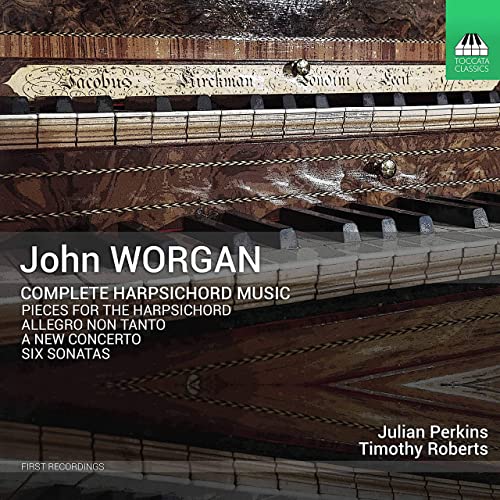Julian perkins, Timothy Roberts
76:34
Toccata Classics TOCC 0375
Click HERE to buy this on amazon.co.uk – digital download only
[These sponsored links help the site remain alive and FREE!]
More options are available from the publisher’s website HERE
The name of John Worgan (1724-1790) was new to me, not having heard Timothy Roberts’ earlier recording of his complete organ music (Toccata Classics TOCC 0332). A member of an extended family of musicians, he was organist at a number of minor London churches, as well as at Vauxhall Gardens; in both capacities he was particularly famed for his improvisations. Both Domenico Scarlatti and Thomas Roseingrave were early influences on his compositional style. Little of his music survives and what did appear in print was mostly geared to educational purposes and doesn’t necessarily give us a sense of what, or how, he actually played, presenting a challenge to the modern performer. Timothy Roberts elects to play it pretty straight in Worgan’s thirteen short exercises in paired keys for young players, delivering them largely as published in 1780, on a Dulcken copy by Klaus Ahrend. Julian Perkins takes a more adventurous approach in the six sonatas from 1769. These post-Scarlatti works show a considerable variety of forms and styles, in either two or three movements (the sixth is a virtuosic Sarabande with Variations) and allow Perkins to showcase his own virtuosity and sense of whimsy.
They also allow him to exploit the dozen or so different timbres available on the newly restored double-manual harpsichord of 1772 by Jacobus Kirckman (or his workshop), now in Dumfries House. This instrument is particularly well suited to Worgan’s music; it is beautifully recorded, and it is a pleasure to have the chance to hear it. The same instrument is used for the final item here, Worgan’s New Concerto for the Harpsichord of 1785. No string parts survive, and the work is a bit of a curiosity, in an eclectic mix of styles, but Perkins manages to bring it off with some panache. Roberts’ highly informative sleeve notes conclude by saying that Worgan’s music ‘needs no deep musicological understanding to be enjoyed’. It represents a public, rather than a profound, expression but it is good for the spirits and certainly well worth a hearing. Both players have done the composer proud in this welcome recording.
Noel O’Regan
